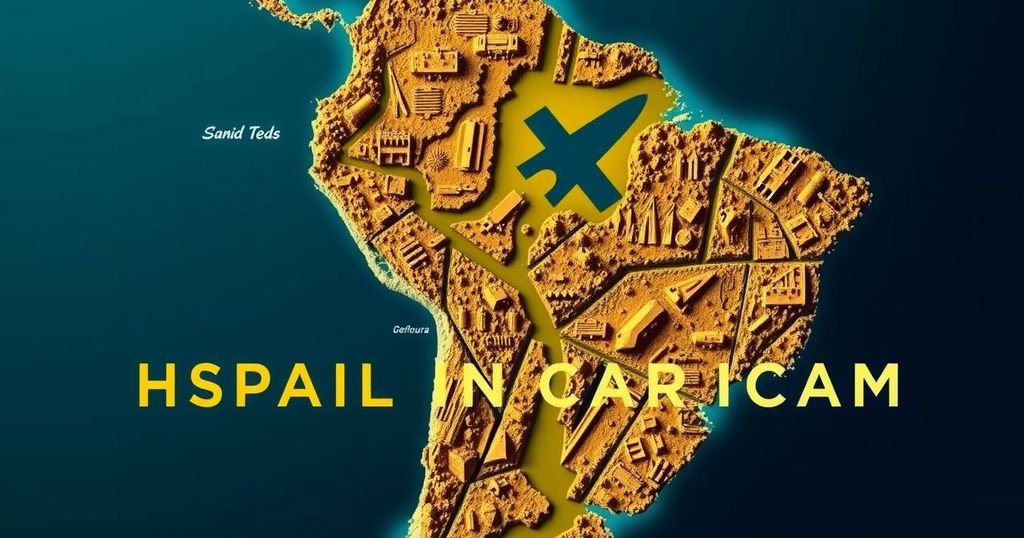Iran and Hezbollah have intensified their presence in Latin America through illicit activities, particularly in the Triple Border region and countries like Bolivia and Chile. Officials in Argentina have raised alarms and emphasized the need for regional cooperation to counter these threats. Hezbollah’s activities are deeply tied to drug trafficking, making the situation complex and concerning for local and international security.
Iran, together with its proxy Hezbollah, has been enhancing its operational capabilities through illicit activities across strategic locations in Latin America, significantly impacting countries like Bolivia, Brazil, Chile, Colombia, and Paraguay. The Argentine Security Minister, Patricia Bullrich, has raised alarms regarding Hezbollah’s activities, particularly in the Triple Border area of Argentina, Paraguay, and Brazil, as well as in northern Chile. Bullrich has shared confidential reports highlighting Hezbollah’s involvement, notably through the Barakat family’s support for the organization. Fabián Calle, an expert in International Relations from Austral University in Argentina, stated that Hezbollah has been acknowledged in Latin America since the 1990s. Its global expansion is largely attributed to Lebanese diaspora communities, exacerbated by the Lebanese civil war. Political scientist Emanuele Ottolenghi corroborates the documented presence of Hezbollah in Chile and Bolivia, noting that the region’s growing drug trafficking networks provide Hezbollah with opportunities for money laundering and illicit funding. Calle noted, “This situation is framed as activism. The Iranian regime’s defiant stance threatens the international balance of power.” Iran perceives South America as a strategic venue for its revolutionary activities due to its proximity to the United States. The lack of institutional stability in certain areas has allowed Hezbollah to exploit these vulnerabilities for various illicit activities. Reports from French magazine Le Point indicate that Hezbollah may be expanding its influence from a religious center in Bogotá, Colombia, which reportedly serves as a cover for its operations, primarily funded by drug trafficking profits. Calle remarked, “This action by Hezbollah is to connect with groups involved in drug trafficking, money laundering, and organized crime networks, which seek to erode the rule of law in Latin America.” Despite some claims of decreased terrorist operations in the Triple Border region, Paraguayan President Santiago Peña emphasized the necessity for vigilant monitoring of the connections between organized crime and terrorism. Ely Karmon, a researcher at the Counter-Terrorism Institute, asserted that the activities of Hezbollah and Iran are rooted deeply within Lebanese Shiite communities across the globe. Calle emphasized the critical importance of intelligence collaboration and information sharing among regional security forces to counteract the intertwining of drug trafficking and terrorism. He stated, “That Argentina has alerted Chile of the alleged operation of money movements linked to Hezbollah, is of utmost importance in the framework of regional cooperation.”,
Hezbollah, a Shiite militant group based in Lebanon, has long been recognized for its global presence, often in collaboration with Iran. In recent years, South America has emerged as a growing area of concern regarding Hezbollah’s illicit activities, primarily due to the geographic and political contexts that allow for drug trafficking and organized crime to flourish. The Triple Border area, encompassing Argentina, Brazil, and Paraguay, has been a focal point for these activities, which pose challenges to regional stability and security.
The growing presence of Hezbollah in South America, backed by Iran, underscores a significant shift in the dynamics of regional security. As these networks expand through drug trafficking and less regulated areas, the implications for law enforcement and security agencies are profound. Increased international cooperation and heightened vigilance are essential to counteract the intertwining threats of terrorism and organized crime fueled by geopolitical interests.
Original Source: dialogo-americas.com






